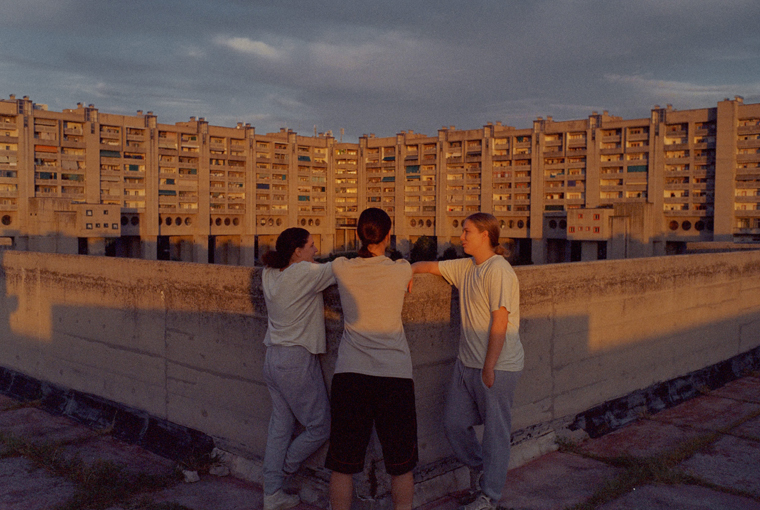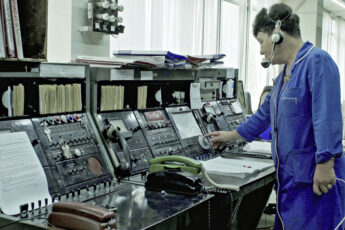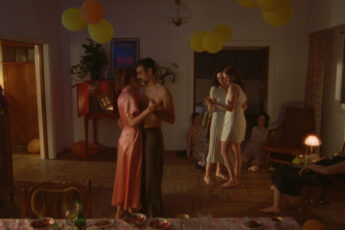
The feature debut of Slovenian director Kukla (aka Katarina Rešek) arrived in Sarajevo’s Heart of Sarajevo competition fresh from its world premiere in Locarno. Fantasy’s joyful celebration of sisterhood and self-discovery offers a uniquely tender exploration of queer life. The ensemble cast earned the festival’s Best Actress award for their collective performance. At the heart of the film is the arrival of Fantasy (Alina Juhart), a charismatic transgender woman who disrupts the concrete ennui of three girls living in a working-class neighborhood.
Fantasy is a playfully experimental coming-of-age drama that does not fail to seem authentic. We closely follow three tomboyish friends in their early twenties, Sina (Mina Milovanović), Mihrije (Sarah Al Saleh), and Jasna (Mia Skrbinac), as they navigate traditional expectations in a patriarchal society. Trapped in the sluggish grind of everyday life, their lives are turned upside down when they meet Fantasy, who awakens new desires in each of them – not just sexual ones, but a deeper yearning to break free from their confined environment in Slovenia.
Refusing any prescribed path, Fantasy invents her own rituals, all delightfully eccentric: she steals dozens of flower bouquets from the graveyard to fill her pink apartment and drapes herself in flamboyant kimonos, always with flawless hair and lip gloss. Her meetings with married men for sex hint at a darker, more precarious side of her life. The scene of Fantasy’s first encounter with the girls is both funny and magical. Meeting in a gray office, they whisk her away on their scooters to the housing estate, where she treats them to an extravagant ice cream sundae, complete with tiny umbrellas and sprinkles.
A talented kickboxer, Sina finds herself entangled in an unequal relationship with her coach while Jasna takes a job on a French cruise ship. Threatened by her traditional Albanian parents with an arranged marriage, Mihrije follows Fantasy on a road trip to Northern Macedonia, where their journey briefly turns into a love story. Playing with the idea of the female gaze, director Kukla was inspired by the phenomenon of so-called “sworn virgins,” a tradition in the Balkans where women take on the social role of men. Like modern sworn virgins, Mihrije, Sina, and Jasna retreat from traditional society into their self-chosen sisterhood.
All dressed in pale tracksuits, the girls’ dire lives contrast with Fantasy’s vibrant presence. Their gradual transformation is mirrored by the film’s visual palette: Kukla guides her characters from sweatpants and concrete Brutalist blocks (the scenes were actually shot on an estate in Trieste) into a realm of lilac, glitter, and vibrant dresses. It’s Fantasy’s unapologetic embrace of femininity that inspires the girls to finally pursue their own dreams of self-expression and imagine new ways of living. Their bond gradually erodes. In the end, Mihrije realizes that Fantasy has disappeared, like a dream vanishing in the morning light.
In the Q&A after the Sarajevo premiere – with all four actresses on stage, some moved to tears – Kukla described the project as “a very intense process, and for a few years, we were discovering ourselves, discovering each other, creating a bond, creating sisterhood really. I can say this has been my second family, for sure.” Fantasy is wonderfully exploratory, reimagining what it means to be a woman, a friend, and a sister.
The project, expanding on Kukla’s short film Sisters (2020), evolved into a feature with each actress co-developing her character over the years: “I believe they know their characters best, more than me for sure,” Kukla said. This intimacy translates into a unique chemistry on screen: the performances feel lived-in and tangible, drawing on “a decade of self-discovery and growth.” Fantasy is not just a film but an experiment with using filmmaking as a medium of collective flourishing.
Kukla once described herself as a “Slavic gangsta geisha pop artist,”1 and her background in short film and music video is palpable throughout Fantasy. There’s an emphasis on color and interior detail, elements of magical realism, and surreal sequences with heightened intensity that are punctuated by music. One of the most memorable scenes feels choreographed: after her father’s funeral – briefly slipping back into her old clothes and identity – Fantasy reemerges in a silver dress, channeling her grief into a ritualistic drag performance before her elderly relatives. The scene crescendos as all women dance together to pumping pop music.
Beneath the glamour lies a serious interrogation of identity and the formation of chosen families that can “light the cracks that we all have,” as Kukla described it after the Sarajevo premiere. Juhart adds: “I read the script and I was crying so hard. I had to start to read again because I had to console myself for a bit. It was so real, so raw, and at the same time beautiful.” Fantasy is a confident, vibrant, and genre-defying debut, at once rooted in the lived realities of its characters and an imaginative tale of post-Yugoslav identities. In the words of Juhart: “The Balkan is my home. And I often say I’m Jugoslavinka [a Yugoslav woman]. I’m a Balkan girl.”
- Kajzer, A. (2017, September 24). Slovenia: Kukla – “Crne oci” – beehype – Best Music from Around the World. beehype. https://beehy.pe/kukla-crne-oci-slovenia/ ↩︎




Leave a Comment